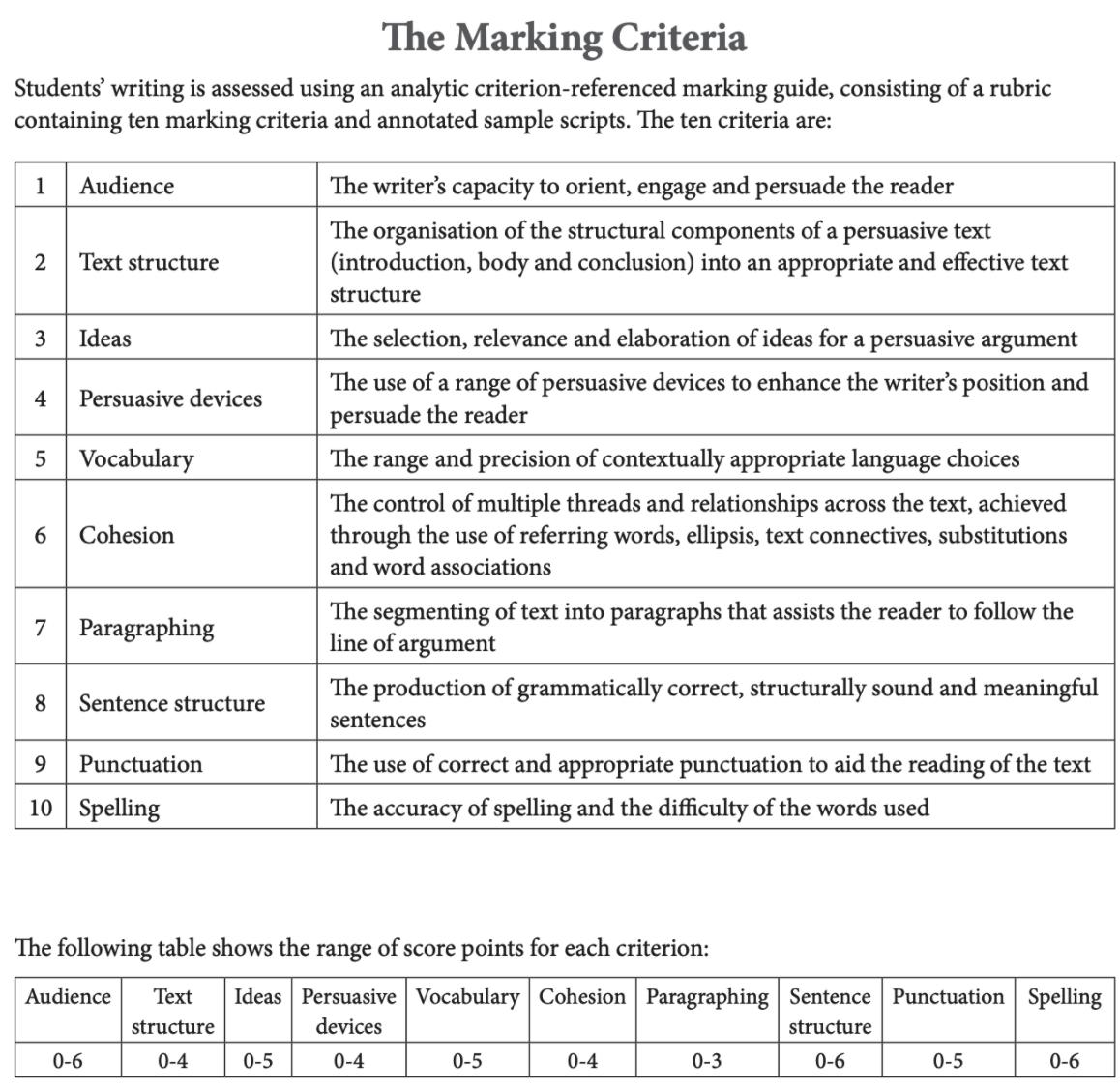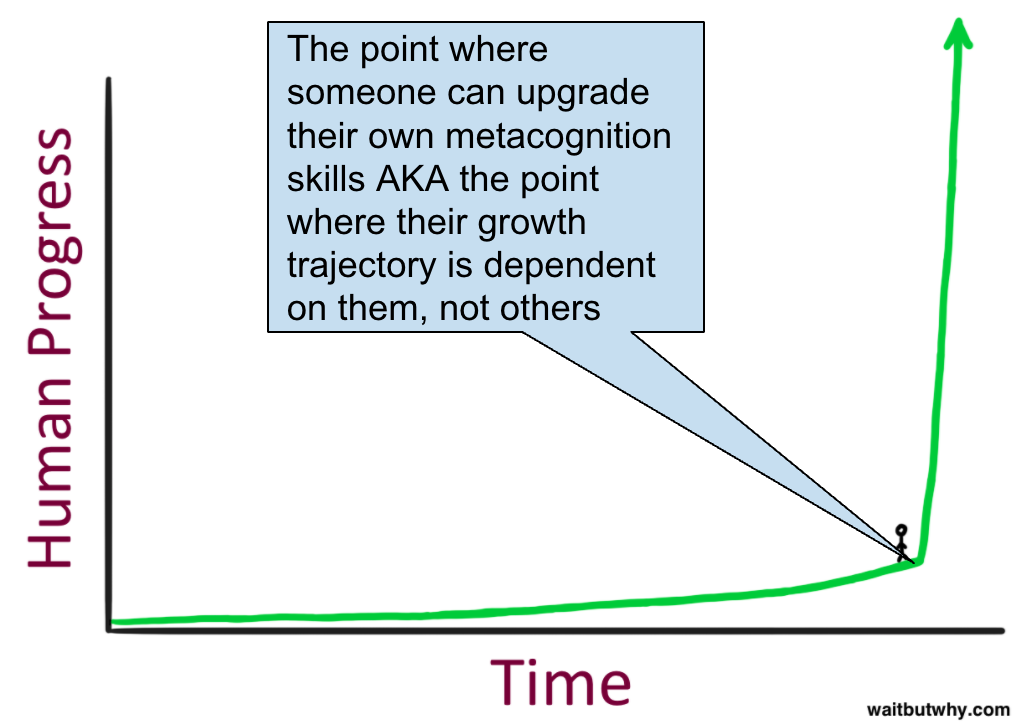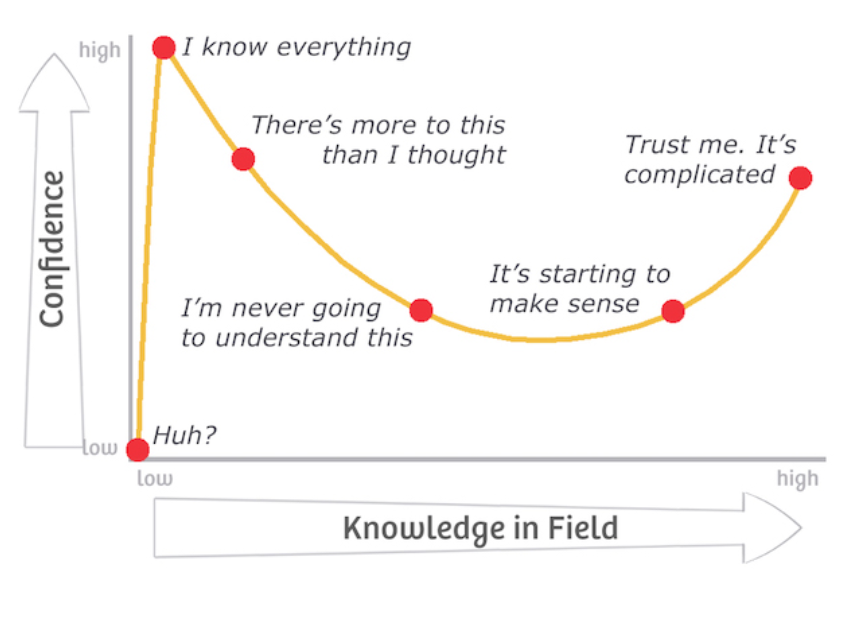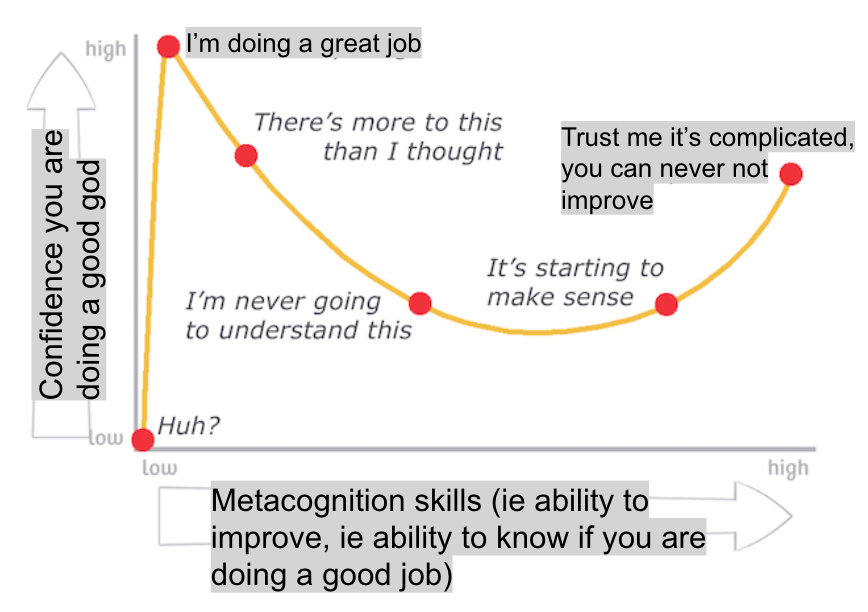Metacognition - the ultimate skill
/By Duncan Anderson and Sheldon Kendrick. To see all blogs click here.
Summary reading time: 4 mins
Total blog reading time: 17 mins
Summary: metacognition is your ability to upgrade yourself. IMO this is the most important skill as being good at metacognition means you can be good at anything. IMO people are normally taught how to do a task well (procedural learning), not how to improve at tasks well (conceptual learning). IMO one can systematically upgrade one's ability to upgrade, IMO one can systematically upgrade other’s ability to upgrade. Read on for strategies to maximise metacognition.
“People who lack the cognitive skills required to perform a task typically also lack the metacognitive skills required to assess their performance. Incompetent people are at a double disadvantage, since they are not only incompetent but also likely unaware of it.” (Behavioral Scientist, April 13, 2020)
Metacognition = awareness of one’s own thought processes
“You do not learn from your mistakes, you learn from reflecting on your mistakes.”
Metacognition = your ability to reflect on your thought processes.
Being able to reflect means you are able to understand, review and thereby improve your thought processes.
Metacognition = being able to improve your thought processes through awareness of your thought processes.
Metacognition = the skill of being able to upgrade yourself.
This is a mega (not meta) oversimplification - there are two categories of people:
1. No metacognition skills = cannot reflect on their thoughts and thereby cannot upgrade themselves.
2. Have metacognition skills = can reflect on their thoughts and thereby can upgrade themselves.
Reflection vs Metacognition - aka reviewing vs building a repeatable system where you stand on the shoulders of others / yourself
From Sheldon:
One way to inaccurately sum up this blog would be to say “be sure to spend time reflecting” but there is more to metacognition than that.
I would say that metacognition is a particular type of reflection, where you are reflecting on your thoughts, feelings, processes rather than on specific actions
You could reflect on a basketball game and think “I should have passed instead of taking that shot…”, but metacognition would be thinking “why did I choose to take that shot in the moment and how can I avoid similar mistakes in future?”
Thus metacognition gives the ability to upgrade yourself more broadly, as opposed to reflecting on one specific action.
Reflection relativities:
L0: No reflection whatsoever
L1: “That was good/bad”
L2: “That was good/bad because of these actions”
L3: (Good reflection) “That was good/bad because of these actions and here’s what I would do if I had my time again”
L4: (Metacognition) “What were the thoughts/feelings/processes that led me to that course of action?” Build a repeatable system for how to approach it in future
Reflection vs Metacognition - aka reviewing vs building a repeatable system where you stand on the shoulders of others / yourself
From Sheldon:
I say this because one way to inaccurately sum up this blog would be to say “be sure to spend time reflecting” but there is more to metacognition than that.
I would say that metacognition is a particular type of reflection, where you are reflecting on your thoughts, feelings, processes rather than on specific actions
You could reflect on a basketball game and think “I should have passed instead of taking that shot…”, but metacognition would be thinking “why did I choose to take that shot in the moment and how can I avoid similar mistakes in future?”
Thus metacognition gives the ability to upgrade yourself more broadly, as opposed to reflecting on one specific action.
Reflection relativities:
L0: No reflection whatsoever
L1: “That was good/bad”
L2: “That was good/bad because of these actions”
L3: (Good reflection) “That was good/bad because of these actions and here’s what I would do if I had my time again”
L4: (Metacognition) “What were the thoughts/feelings/processes that led me to that course of action?” Build a repeatable system for how to approach it in future
Metacognition magnitudes
In one respect metacognition is your ability to review your work and figure out how to upgrade it.
Levels
L1: cannot use another's classification system (eg rubric to mark an exam)
Simple example
Complicated example
L2: can accurately use another's classification system to rate eg 3 of 5 marks but cannot give actionable information to yourself or another on how to upgrade to 5 of 5 marks (poor teacher)
L3: L2 + can give actionable information on how to upgrade from one approach (average teacher)
L4: L3 + can give actionable information on how to upgrade from multiple approaches (good teacher). Eg can explain how to improve the answer but also write another correct answer that is using a different example or structured differently and then compare and contrast.
L5: can upgrade others to be able to use this classification system for to rate themselves
L6: can make your own system to analyse the quality of work
L7: L6 + can accurately grade work on your custom system
L8: L7 + can give actionable feedback on this system to improve to yourself and others.
L9: can build others who can make their own classification systems AKA can build others who can upgrade their own metacognition skills.
At this point someone is ‘free’.
Visualisation of someone’s growth once they can upgrade their own metacognition skills.
IMO your body is limited. IMO your mind is limitless.
Jingle: IMO the sooner someone realises their mind can be limitless… the sooner it becomes limitless.
+++++++++++++++++
Details
“Freedom of speech is the master value, because it is the value through which we upgrade all other values.” Sam Harris
“Metacognition is the master skill, because it is the skill through which we upgrade all other skills.” Duncan Anderson
Those who do not learn from the past are doomed to repeat its mistakes. The future does not repeat the past… But it does rhyme.
You spend time learning new ideas. You spend time learning from others' mistakes. You should spend time learning from your mistakes.
Metacognition = reviewing others and yourself and explaining how to improve in an actionable fashion. Eg making a recipe, the criteria for a good recipe and calibrating yourself vs reality.
What would you do differently if you had your time again? IMO if the answer isn't ‘everything’ then you are not being properly vulnerable.
When I review my work I try to see how I’d change everything…
.... somethings I’d only do 10% differently.
… other things 100% differently.
… I try to have nothing that I’d do 0% differently! IMO this is getting high on your own supply.
I love the discipline of trying to see how to do everything differently!
Trying to justify why you were wrong is giving yourself the gift of improving.
Trying to justify why you were right is imprisoning yourself in mediocrity.
IMO (almost) everything can be improved always.
Metacognition = the most important skill, as it is the skill of getting better.
If you are the best at getting better you can be good at anything… including new things. New high value things that currently don’t exist.
You can invent things.
You can help upgrade others.
Without metacognition skills you need to pick the right uni degree, or get the right job. IMO with metacognition skills life is about building your own ‘uni degree’ (professional development), life is about building your own job.
Without metacognition skills IMO life is about being in the right place at the right time. With metacognition skills any time and place can be the right time and place.
IMO if you have strong metacognition skills then if you don’t have a good life it’s on you. It’s not others' fault.
IMO everyone can have strong metacognitive skills… but IMO no one is born with metacognitive skills… you can’t walk or talk!
IMO strong metacognition skills = learned help yourself-ness. IMO weak metacognition skills = learned helplessness.
Bad outcome * strong metacognition skills = upgrade yourself = growth mindset = learned help yourself-ness = post traumatic growth
Bad outcome * weak metacognition skills = don’t upgrade yourself = fixed mindset = label yourself as ‘bad at something’ = learned help yourself-ness = post traumatic stress
IMO what is one of the goals of the secondary education system? To build metacognition skills in students
IMO procedural learning is teaching memorisation of others ‘if/then’ statements.
IMO conceptual learning is helping students create ‘if/then’ statements.
IMO we can shift the way content is taught in secondary schools to be ‘conceptual understanding’ and hence massively improve the metacognition skills students leave secondary school with.
Examples of metacognition
At Edrolo and OwlTail (two companies I co-founded) we try to have meta explanations ahead of time and after time for much of what we do.
I think you should try to be able to rate your performance in all key areas. Here is a MECE for you:
The work you do
Meetings you do
Verbal communication
Written communication
Example 1: doing work - making a textbook.
For instance if we are making a textbook we try to do the following:
1. Create a recipe for what the content should be. A recipe is a meta explanation of how we would like to make content that is used as the macro guide for making the content.
2. We try to create quality measures for each component of the recipe.
3. When making content we want the author to write down how they think they are going on quality (eg quantitatively rate against a framework and qualitatively explain what they think quality is)
4. For important parts of the recipe we have the content reviewed by a non-author who writes their view on quality (eg quantitatively rate against a framework and qualitatively explain what they think quality is)
5. Then we compare the ratings and see what we can learn.
“Give me six hours to chop down a tree and I will spend the first four sharpening the ax.” Lincoln
When making a lesson for a textbook at Edrolo we might have a split like the following:
Metacognition: 20% of total time with the author planning what to write for the lesson based on the recipe (ie in a systematic fashion)
Metacognition: 10% of total time with a reviewer reviewing the plan for a lesson against a system
Doing: 40% of total time with the author writing the lesson
Metacognition: 10% of total time with the author reviewing the content they have created against a system (recipe + quality measure for recipe)
Metacognition: 10% of total time with a review reviewing the content the author created against a system (recipe + quality measure for recipe)
Doing: 10% of the total time implementing the upgrades found from reviewing
In this example 50% of the time is spend doing and 50% planning and reflecting on doing (aka metacognition).
IMO if you don’t spend time trying to get better you will not get better. Hope is not a strategy. Hoping to get better is not a strategy. If you spend 100% of your time doing (execution) then you will likely not be getting better.
IMO it can feel like reflecting on execution is ‘wasting’ time as you are not getting anything done… but I’ve found that it’s actually ‘creating time’ as you improve at speed and quality through reflection (metacognition) and hence improve how much output you get done thereby buying back time.
IMO if you cannot explain what you are doing you do not understand what you are doing.
IMO if you cannot explain why something is good or bad then examples of what is good or bad then you don’t know if it is good or bad.
“If you can't explain it to a six-year-old, you don't understand it yourself.” Einstein
You need to be able to explain it clearly and simply.
Metacognition = the process of explaining how you think
Metacognition = the process of explaining how what you have done can be improved
Metacognition = the process of explaining how what others have done can be improved
Example 2: meetings: eg sales call, investor call, internal meeting
For important meeting I try to:
1. Make a plan before the meeting (metacognition)
2. Write during the meeting things that go well and things that don’t (metacognition)
3. Review after the meeting with others how things went (metacognition AKA Post Game Analysis)
For a sales meeting:
I try to build ahead of time what will lead to a ‘yes’. I typically try to define this as the ‘minimum sufficiency to get a yes’.
Example yes sufficiency equation = 1. Convey 2x+ deal maker jobs to be done +2. Identify and handle any objections
Then after the call I rate how the call went with someone else then compare to eg if the school buys the textbook and why. I LOVE trying to calibrate whether my perception aligns with reality.
Example 3: verbal communication
Believe it or not you speak to people a lot. If you can get better at speaking to people then your interactions with others improve. So IMO one should spend time trying to improve at discussions.
I speak in a podcast with my friend James here.
After each podcast is live James and I listen to the podcast and then try to deconstruct how we can improve and give each other feedback using Voxer.
I’ve honestly found this giving feedback to be the best part of doing the podcast.
Slowly we get better at finding ways to help each other improve. Slowly I’m becoming more aware of how I speak in a discussion and being able to actively choose how to speak vs 'unconscious blurting of verbal diarrhea’ ;).
Example 4: written communication
Believe it or not you do a lot of written communication.
If you want to go fast, go alone. If you want to go far, go with others. No journey is long with good company.
IMO if you want to make a big difference to the world the more people you can work with the better.
As such, IMO learning how to play a multiplayer game well is very important. I’ve found one key component of playing a multiplayer game is written communication.
These blogs are an example of me practicing written communication. Here is my process:
1. Write V1 of blog.
2. Leave it a week and then update to V2 (metacognition)
3. Give the blog to another to provide feedback on how to improve (metacognition)
4. Send the blog to people I work with and ask them to respond with a key thought or 2
5. Discuss as a team
I hope my writing skills are improving… and that my skills to improve my writing and others writing (metacognition) are improving.
One thing I try to develop is multiple forms of communication like visual models, equations, taxonomies, analogies, humour etc.
Some of my fav questions for building metacognition in myself and others
Are you able to please explain to me what you think the line for sufficiency of what a good job is? (vs here is what I think doing a good job is)
Can you please explain what is just above sufficiency and why? (vs here is an example of doing better than sufficiency)
Can you please explain to me what you think is just below sufficiency and why? (vs here is an example of doing worse than sufficiency)
Do you think your performance is inline, above or below sufficiency and why? (vs I think you have done below / inline / above sufficiency)
What is the key thing you think you did well and why? (vs I think the key think you did well is)
What is the key thing you'd do differently if you had your time again and what would make it better? (vs I think the key thing you can improve is)
If you were to write a blog about what you did what would the blog be about and why? (vs are you please able to write a blog about…)
Comment:
IMO good coaches / managers / peers / friends don't tell others how to improve. IMO good coaches help others find ways for themselves to improve.
IE don't give someone a fish (show how to improve), teach someone to fish (build metacognition skills in others).
IMO try not to show people how to do well, try to show people how to improve well.
If you only take away one thing
Metacognition might seem like a difficult thing to do… and I’m not saying that it is easy but boy is it fun!
IMO being able to improve yourself and others is one seriously rewarding activity in life.
I’ve found that a path to improved metacognition is simply reviewing your and others work and trying to explain if it is good / bad and then how to improve it…
… in case it isn’t clear these blogs are attempts to improve myself and others… AKA these blogs are building metacognition skills.
Honestly, the best path I’ve found to improve metacognition skills is blogging like this once a week. If I had one piece of advice to 10 years ago Duncan it would be ‘write a blog a week on anything that interests you’.
A tangent: Doing well in a field = 1. Knowledge in field * 2. Metacognition skills
1. Knowledge in a field (an adaptation of the Dunning-Kruger effect)
In the field of psychology, the Dunning–Kruger effect is a cognitive bias in which people with low ability at a task overestimate their ability. It is related to the cognitive bias of illusory superiority and comes from the inability of people to recognize their lack of ability. Without the self-awareness of metacognition, people cannot objectively evaluate their competence or incompetence.
Dunning Kruger in visual form:
I love this quote: “Ignorance more often begets confidence than knowledge.” —Charles Darwin
2. Metacognition skills
Visualisation 1
To do well in a field you need to have strong knowledge AND strong metacognitive skills
It doesn't matter how much you know, it matters how much you know you know!
It doesn't matter how much you think, it matters how well you think about thinking!








